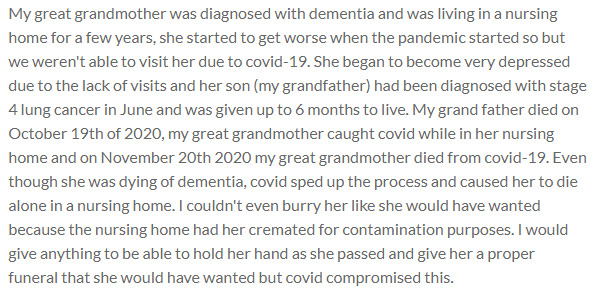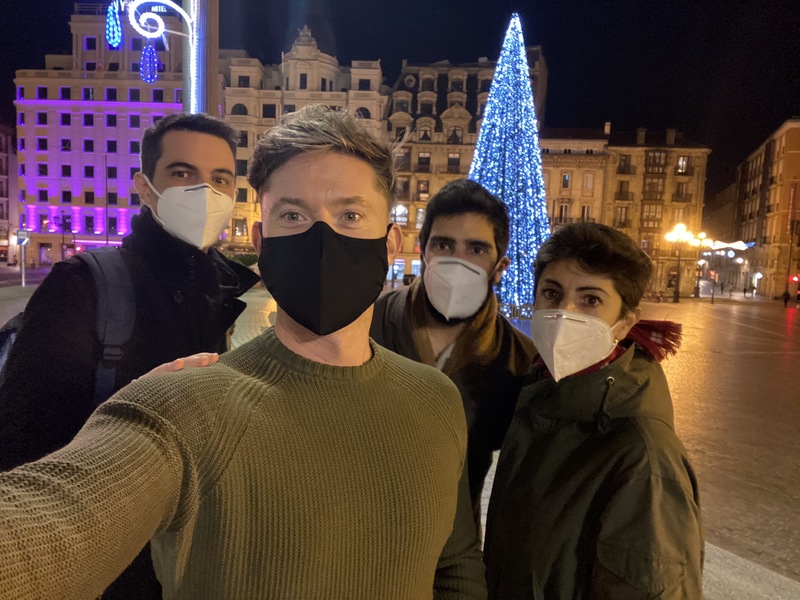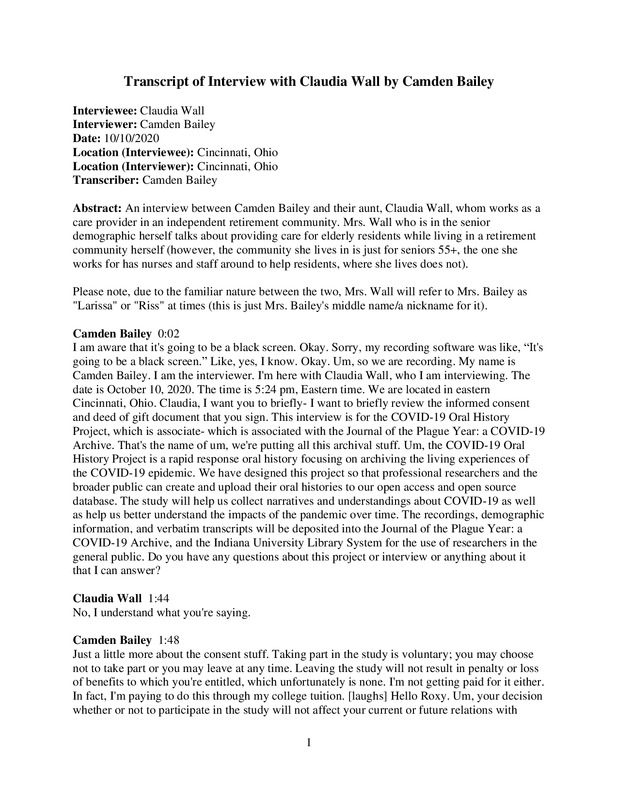Items
topic_interest is exactly
dementia
-
2022-04-29
Dementia and Covid
Over the last two years, being away from people, and having to social distance, I have still taken care of my grandfather. He has Dementia. Now that things are starting to get a little better, and a lot of people have been vaccinated, I have been able to have him come stay the night at my house every Friday. The first couple of times he was confused, but now he seems to instinctively know the routine of it all. He likes getting to spend time with my stepdad and my girlfriend, and walk outside to see the horses. Covid has taken a lot, besides the countless lives. It rapidly increased my grandpa’s progression in memory loss. Most days he can’t quite remember my name or my mom's name. But at least he is happy, he laughs and smiles, and knows that he loves and trusts us. Him not being able to have as much social interaction as he used to has drastically changed his cognitive abilities. Today is a Friday. He was pretty quiet on the drive from his house to mine. I got him an ice cream cone. No matter where he is cognitively that man will always, always want an ice cream cone. Vanilla to be specific. We used to get ice cream cones from McDonald's when I was little when he would pick me up to spend the night at his house. I wonder how many ice cream cones we have left. I hate that his memory has been cut short and stripped from him. He had been slowly declining for the last few years before Covid, but once we hit the lockdowns, it was all over. He was good at hiding it for the first 6 months or so, but in the last year and a half it has been very clear. I miss who he was, I know we all do. -
 2022-04-09
2022-04-09Covid sped up my great grandmothers death
My great grandmother was diagnosed with dementia and was living in a nursing home for a few years, she started to get worse when the pandemic started so but we weren't able to visit her due to covid-19. She began to become very depressed due to the lack of visits and her son (my grandfather) had been diagnosed with stage 4 lung cancer in June and was given up to 6 months to live. My grand father died on October 19th of 2020, my great grandmother caught covid while in her nursing home and on November 20th 2020 my great grandmother died from covid-19. Even though she was dying of dementia, covid sped up the process and caused her to die alone in a nursing home. I couldn't even burry her like she would have wanted because the nursing home had her cremated for contamination purposes. I would give anything to be able to hold her hand as she passed and give her a proper funeral that she would have wanted but covid compromised this. -
 2020-11-15
2020-11-15New York, Bilbao, New York
In November 2020 I began reading Kirmen Uribe's novel Bilbao New York Bilbao while in Bilbao, Spain with my partner. We were there to care for his father who is suffering through the late stages of dementia and to spend time with his family who he had not seen in a year. Uribe's novel is important to my plague year for many reasons. He talks about the split mind being from Bilbao yet living in New York. My partner is from Bilbao, and the novel helps me understand his mindset. But Uribe also talks about the ways humans remember and carry pain and mark loss. Unlike trees who carry their growth in their rings or fish who mark time through their scales, humans mark time and pain through simply marking time. He notes that fish grow their entire lives, but humans start dying and shrinking from the moment we hit maturity. Growth, it seems is only for the fishes. My plague year was marked by my entire partner's family getting the virus, a story of gradual family loss, one of borders, and of course a presidential election. The pandemic closed not only schools and bars but also borders and our chances to move between Spain and the U.S. in any straightforward way. When we began planning the trip in the summer of 2020, we came up against all of the travel bans in place. My Spanish partner could get to Spain, but I could not. So, the research began, and I spent more time on Facebook groups than any person should be allowed to. We knew we weren't going to Spain just to have fun. We needed to take care of his father, but it felt like we were doing something wrong. Love, it turns out, knows no national borders, but border agencies certainly do. To get to Spain, he just hopped a plane to Madrid. I had to go through Lisbon, London, and Paris before arriving there. On the way back, I hopped on a plane flying directly to New York. He had to quarantine in Mexico for two weeks. Our stay there was marked by his father's continued decline but also moments of joy. The picture here captures one of those. As a U.S. citizen, his Spanish family and friends are always asking me about U.S. culture and practices. One of my tasks in Spain was to cook a big American Thanksgiving dinner, which I did with gusto. I made all the things: turkey, sweet potatoes, green bean casserole, mashed potatoes, cranberry sauce, and pecan pie. I tried to explain the significance of each dish while realizing how insignificant and somewhat gross Thanksgiving foods are. But we had fun and spent the night after the meal singing "American" songs and discussing art--his cousins are all artists. That night, one of his friends recommended I read Uribe's novel. So, I ordered it that night. It is a lonely book of loss and thinking about how art marks that loss. I think that is how we marked our time in Spain contemplating everything we had lost in 2020 and everything we were gradually losing. We spent time at the Guggenheim and Fine Arts museums in Bilbao. In fact, we waited for my partner's COVID test while browsing the Fine Arts Museum. It turned out positive, and we separated at the point for two weeks. But the picture here represents a moment of joy as we said goodnight to my partner's cousins after the Thanksgiving weekend. I hope for all the clichés of going back to normalcy. And we probably will get back to the "before times" given humans' inability to learn from any of their experiences. But I am one of those humans and just want to sit at a bar and talk to strangers again. When that normalcy returns, I will look back at this picture and remember Uribe's words: "As with the growth rings of fishes, terrible events stay on in our memory, mark our life, until they become a measure of time. Happy days go fast, on the other hand--too fast--and we forget them quickly." Maybe Uribe is wrong, though. I will not be forgetting this day anytime soon. -
 10/10/2020
10/10/2020Claudia Wall Oral History, 2020/10/10
An interview between Camden Bailey and their aunt, Claudia Wall, whom works as a care provider in an independent retirement community. Mrs. Wall who is in the senior demographic herself talks about providing care for elderly residents while living in a retirement community herself (however, the community she lives in is just for seniors 55+, the one she works for has nurses and staff around to help residents, where she lives does not). Please note, due to the familiar nature between the two, Mrs. Wall will refer to Mrs. Bailey as "Larissa" or "Riss" at times (this is just Mrs. Bailey's middle name/a nickname for it).
